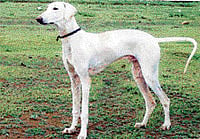
In an out-of-the-box move, the Karnataka Veterinary, Animal Husbandry and Fisheries Sciences University, Bidar, has taken up the task of protecting, preserving and promoting one of the most sought after varieties of the pet for not only helping native breeders to make a handsome livelihood, but also encourage them to adopt scientific ways of breeding to avoid any genetic deformities that may threaten the very existence of the variety.
The hounds have long, thin necks, strong forelegs and a remarkably tucked-in tummy, making them look lean to the point of looking starved.
The hounds are very popular among dog lovers, but their breeders hardly get a remunerative price for their puppies, although the market potential is huge. People from across the country throng Mudhol to buy puppies at throwaway prices of Rs 2,000- 2,500 and in turn make a quick buck by selling them at exorbitant prices.
In order to prevent exploitation of breeders, the university has decided to establish a Canine Research and Information Centre (Mudhol Hound) on 40 acres of land at Thimmapur village near Mudhol in Bagalkot district. The State government has sanctioned Rs five crore for the project.
Though there are a large number of schemes to support livestock, there are no schemes to support companion animals such as dogs. “But this is an exceptional case. For the first time in India, we have taken up supporting dog breeding as it involves the livelihood of hundreds of families in and around Mudhol. Nearly 95 per cent of them are SC/ST, backward, small and marginal farmers,” said Vice Chancellor Suresh Honnappagol.
The first-of-its-kind project in the country aims at conserving, propagating and developing the Mudhol variety and make it more popular. The Indian Council for Agriculture Research has also supported the move.
Mudhol hounds have been winning prizes at national and international kennel shows. They are the most sought after for two reasons. They are very friendly and essentially watchdogs. They are the excellent companions of shepherds and one Mudhol dog can protect 200 sheep while on the graze. Secondly, they are disease-resistant and cost very little to look after. Since they have no fur, they are free from skin diseases and above all, they have a majestic look.
The university will provide technical assistance for proper and healthy breeding, market information and strategic support to the recently formed Mudhol Dog Growers’ Association (MDGA) and help them get handsome price for Mudhol puppies.
This would serve the twin purpose of economic empowerment of poor breeders and healthy growth of Mudhol hound. “In-breeding is not a new practice among Mudhol breeders. But in-breeding has an inherent genetic risk and we will advise the growers to avoid it,’’ Honnappagol said.
The university has tied up with kennel clubs all over India for the supply of authentic and certified Mudhol hounds. Members of the MDGA will be provided information about dog shows and competitions. The centre will develop a database of prospective buyers and native sellers. The breeders will market their puppies through the university and earn more money.
